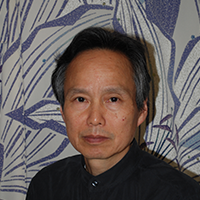Unlined kimono with design in sekidashi style yūzen dyeing. “Beginning of Autumn”
- Textiles
- Presented in 2014
- Sold Out
| Category | Textiles |
|---|---|
| Year Presented | 2014 |
| Exhibition | The 61th Japan Traditional Kōgei Exhibition |
Masahiro Nakagawa

In his production NAKAGAWA Masahiro adds his own approach to using the Japanese time-honored and traditional resist pastes, such as manori, makinori, shirozukenori, or icchinnori. Manori is the Japanese time-honored starch paste, which is known to have already existed in the Muromachi and Momoyama periods; this natural paste is highly resistant to dyeing (it is made by adding rice bran and salt to mochi rice flour, steaming, thoroughly kneading, and recooking; it is the base for makinori and shirozukenori). The production of textiles with the free use of different techniques requires considerable time, effort, and perseverance; however, by bringing out to the utmost the intrinsic brilliance of the silk, and uniting with the artist’s keen sensitivity, designs of great beauty and dignity are created. When I work on a kimono and obi sash, I use the traditional Japanese starch pastes to express the strong impressions that the changing seasons and the beauty of nature make on me. I generally work on my own, starting from sketching, selecting designs and fabrics, rough drawing, creating and applying resist paste, through to dyeing.

